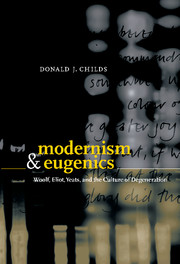Book contents
- Frontmatter
- Contents
- Introduction
- Chapter 1 Virginia Woolf's hereditary taint
- Chapter 2 Boers, whores, and Mongols in Mrs. Dalloway
- Chapter 3 Body and biology in A Room of One's Own
- Chapter 4 Eliot on biology and birthrates
- Chapter 5 To breed or not to breed: the Eliots' question
- Chapter 6 Fatal fertility in The Waste Land
- Chapter 7 The late eugenics of W.B. Yeats
- Chapter 8 Yeats and stirpiculture
- Chapter 9 Yeats and The Sexual Question
- Notes
- Index
Chapter 8 - Yeats and stirpiculture
Published online by Cambridge University Press: 22 September 2009
- Frontmatter
- Contents
- Introduction
- Chapter 1 Virginia Woolf's hereditary taint
- Chapter 2 Boers, whores, and Mongols in Mrs. Dalloway
- Chapter 3 Body and biology in A Room of One's Own
- Chapter 4 Eliot on biology and birthrates
- Chapter 5 To breed or not to breed: the Eliots' question
- Chapter 6 Fatal fertility in The Waste Land
- Chapter 7 The late eugenics of W.B. Yeats
- Chapter 8 Yeats and stirpiculture
- Chapter 9 Yeats and The Sexual Question
- Notes
- Index
Summary
Yeats's earliest acquaintance with eugenics dates from the turn of the century when he was sent for review a copy of Allan Estlake's The Oneida Community (1900), subtitled “A record of an attempt to carry out the principles of Christian unselfishness and scientific race-improvement.” Known neither as a Christian nor as a eugenist in 1900, Yeats was presumably offered the book because of his well-known interest in spiritualism, for chapter eight is titled “A Definition of Spiritualism” and chapter nine, “Investigation of Spiritualism in the Oneida Community.” Yeats wrote no review of the book, however, and, as Edward O'Shea notes, many pages of the copy of the book that is preserved in Yeats's library are uncut, so one might suspect that he did not even read it. Yet it is certain that Yeats read Estlake's book, and it is likely that its influence is responsible for much of the eugenics in Yeats's early work.
The Oneida Community was established in 1848 by John Humphrey Noyes. As J. M. Whitworth notes, “[c]onvinced that the second coming was past, Noyes concluded that he was living in the age of the fulfilment of Christ's prophecies, and hence that perfect holiness and sinlessness were not only attainable in this life, but that only persons who could lay claim to such perfection were truly Christian.”
- Type
- Chapter
- Information
- Modernism and EugenicsWoolf, Eliot, Yeats, and the Culture of Degeneration, pp. 170 - 202Publisher: Cambridge University PressPrint publication year: 2001



